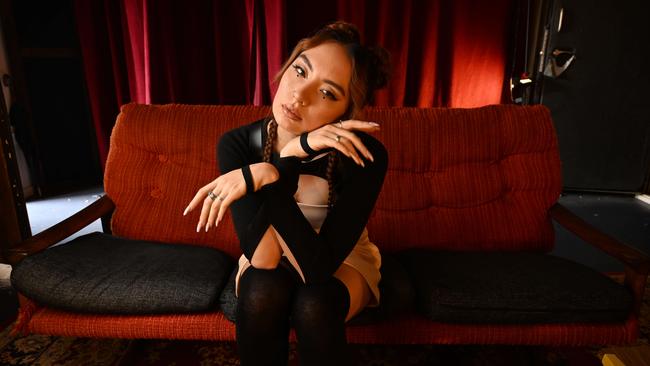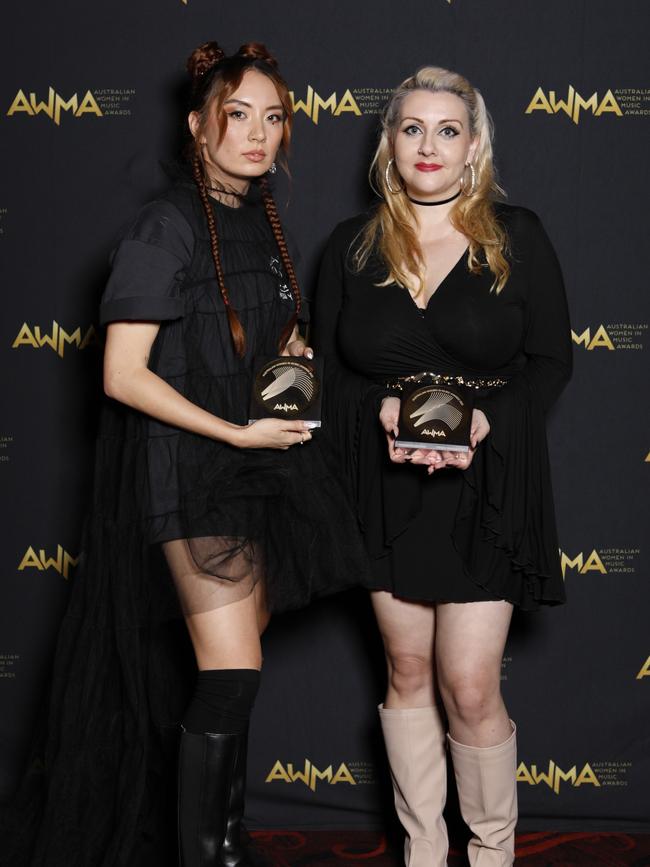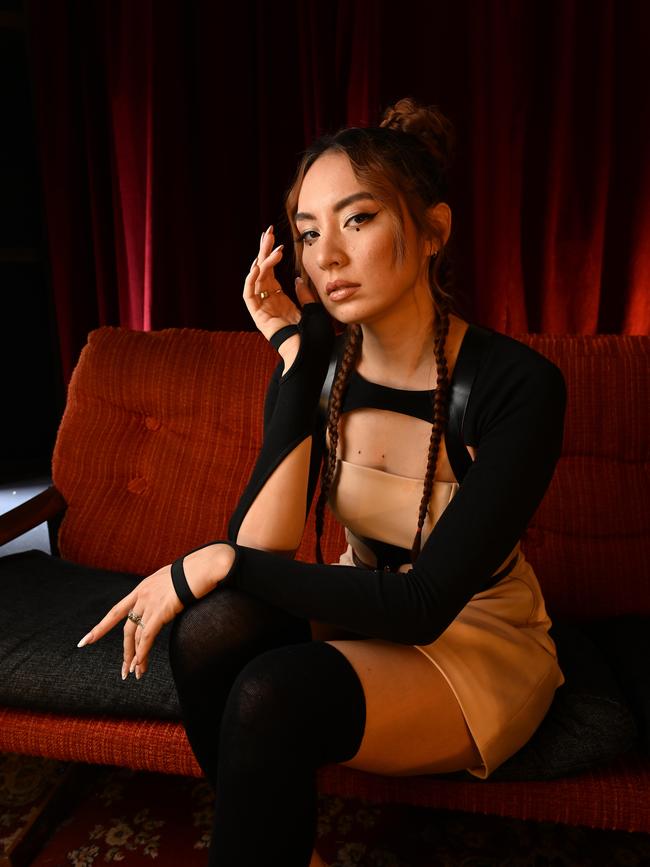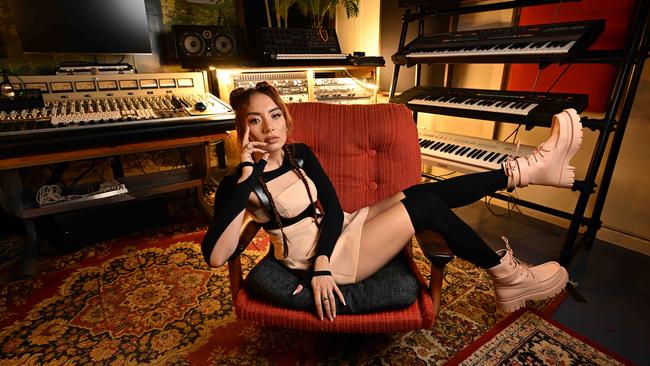Pop artist Jaguar Jonze is prey no more on her debut album Bunny Mode
The debut album by this award-winning Brisbane pop singer-songwriter is a powerful act of triumph over trauma.

Towards the end of an uplifting ceremony devoted to empowering and celebrating female excellence across all aspects of the music industry, Deena Lynch stalked to the stage with a look of determination on her face and a few choice words on her mind.
At the Australian Women in Music Awards in Brisbane earlier this month, one of the night’s final acknowledgments was reserved for two young women whose decision to speak up about their torrid experiences at the hands of powerful men had led to their being named as the joint recipient of a new award: “change maker”.
Standing alongside former Sony Music Australia artist and repertoire co-ordinator Tamara Georgopoulos, Lynch – who writes, records and performs as Jaguar Jonze – looked out into the crowd at The Tivoli theatre and began to speak slowly and forcefully.
“I didn’t want to accept this award, because being given this change maker award is a reminder that I had to push for change in the absence of our industry leaders – the leaders who have the resources and the power to create meaningful change, to protect us and to ensure our workplace is safe, and just,” she said. “Where were they?
“For so long, the music industry has used the glitz and the glamour to hide its true ugliness,” Lynch said.
“It is an industry diseased with a culture of abuse, discrimination and sexual harassment. It is riddled with exploitation.
“With no platform, no power and less privilege, so many of us have risked everything to make sure that we didn’t contribute to that culture of silence, and actively pushed against the cycle of abuse,” she said. “It came at a cost, and I still feel it every day.”

The AWMA acknowledgment arrived just weeks before the release of her debut album as Jaguar Jonze. Titled Bunny Mode, it foregrounds a sophisticated yet accessible pop sound that contains elements of indie rock, industrial noise and electronica. It’s a swaggering, powerful set that announces Lynch as one of the standout voices in Australian pop.
But one of those costs she mentioned in her acceptance speech is that her role as an artist – the very reason she entered the music industry – has been diminished in the face of her highly visible role as an activist, advocate and sexual assault survivor.
For Lynch, it’s a fact that has become increasingly bothersome in the time that has passed since March 2020, when she first detailed her abusive treatment at the hands of two unnamed male music producers, after winning a Queensland Music Award in the singer-songwriter/folk category for her song Beijing Baby.
“Last year in March [2019], while I was working on Beijing Baby, two producers worked together to take advantage of their place of power and sexually assaulted me – for hours,” Lynch wrote on Instagram. “The session for Beijing Baby then got permanently deleted and I lost months of work. It felt like my body was taken and my soul was deleted.”
Weeks later, Lynch re-recorded the song with her trusted bandmates in Aidan Hogg (bass/co-producer/synths), Joseph Fallon (guitar/strings), and Jacob Mann (drums). Four months after the incident, Lynch filed a report with Queensland Police detailing the assault; although supportive, the police advised her it was unlikely that charges would be laid, as both men lived outside of Queensland.
Yet after speaking about it in an interview on Network 10’s The Project in May last year, Queensland Police has since laid sexual assault charges against the alleged perpetrators. Their hearing dates have not yet been set.
During the pandemic, when the nation’s live music industry fractured into state-based pockets for the best part of two years and plenty of artists and workers struggled to earn a living, a major cultural reckoning and #MeToo movement has taken place.
With Lynch at the forefront – first by gamely sharing her experience at the hands of sexual predators, and then becoming a lightning rod by asking fellow assault and harassment survivors to share their stories with her – the sector is at last taking serious steps to enable safe, respectful workplaces for those who choose to devote their lives to music.
When Review meets Lynch at a recording studio and rehearsal space in Brisbane’s inner-north, it’s the morning after the Australian Women in Music Awards, and that look of determination we saw on stage with Georgopoulos has been replaced by an easy laugh and a tangible sense of relief to be speaking chiefly about her art, rather than the more common request of being asked about speaking out.
While she works with Review’s photographer in the control room, Aidan Hogg looks through the glass at his friend and bandmate, and reflects on the person he sees today.

“When I met Deena, she knew exactly what she wanted as an artist, and she always has,” says Hogg, who plays bass in Lynch’s live band. “She has a really strong artistry; a strong idea of what she likes and doesn’t like. Through working together in the last few years, she’s got a lot to say in her music now, and there’s a lot of powerful statements.”
Debuts don’t come much stronger than Bunny Mode, which excels thematically, aesthetically and sonically to tell a compelling story across 11 tracks. The title might seem cute, but it’s a playful riff on the deadly serious subject of her adult diagnosis of complex-PTSD due to childhood abuse.
Like a rabbit in the headlights, Lynch had learned to freeze in response to threats to her safety. As a survival tactic, going “bunny mode” has its advantages in the short-term, but with the help of her therapist and a tight-knit support network, the singer-songwriter has moved beyond the coping mechanism.
Now, backed by three steadfast male bandmates she has no qualms describing as her family, Lynch has reconfigured her trauma into a redoubtable work of art. Its songs contain smart, pointed reflections on her experiences in recent years, all wrapped in hard-hitting, hook-filled arrangements.

Like the big cat of her stage name, this one-time prey has become a predator, and the artist is itching to take these songs on the road – first on a national arena tour supporting British indie rock act The Wombats in June, then on her own headline shows into July.
“I don’t want to be taken for granted anymore,” says Lynch over a cup of tea at a nearby cafe. “I think I’ve given so much into this industry, that it’s easy for the industry to take me for granted.
“But I want people to see how that same passion I’ve given to the advocacy is the same passion I’ve given to my artistry,” she says.
“I want that to be elevated and amplified, and acknowledged and supported, and appreciated, because I think I do have something to say. I have a voice and I stand for a lot of things – and hopefully, I’m also creating music that Australia can be proud of.”
The singer-songwriter notes with sadness that, since speaking out and becoming a figurehead of the music industry’s #MeToo movement, her opportunities for paid live performances have declined drastically.
“I understand why, but I also don’t,” she says. “The very reason why I am one of the only voices to speak out is because we are controlled by that fear of having our careers affected, our reputations tainted, by hurting or upsetting the gatekeepers of our industry. Power is so tilted in this industry that it makes it easy for that to happen.”
Having done far more than one person’s fair share of the heavy lifting in this space – and helping to enact changes such as a national review of sexual harm, sexual harassment and discrimination in the Australian music industry, which is currently underway and due to report in June – Lynch is understandably keen to move on.
“That’s why I gave so much to this album, because it’s a last flagpole-stab into the hill: this is everything to do with this story, but I would like to close this chapter, and I would now like to explore freely with my artistry,” she says.
“I don’t want to be tied to the responsibility of something that I shouldn’t actually be wearing on my own in the first place. I always wanted a debut album that I’m going to be proud of, and so emotionally connected to. I think I’ve done that with Bunny Mode.”
Lynch looks down into her cup, then looks back up and smiles. “But now I’d like to have fun with music.”
Bunny Mode is released on June 3 via Nettwerk Records. Jaguar Jonze’s national tour begins in Melbourne (June 18) and ends in Newcastle (July 10).





To join the conversation, please log in. Don't have an account? Register
Join the conversation, you are commenting as Logout